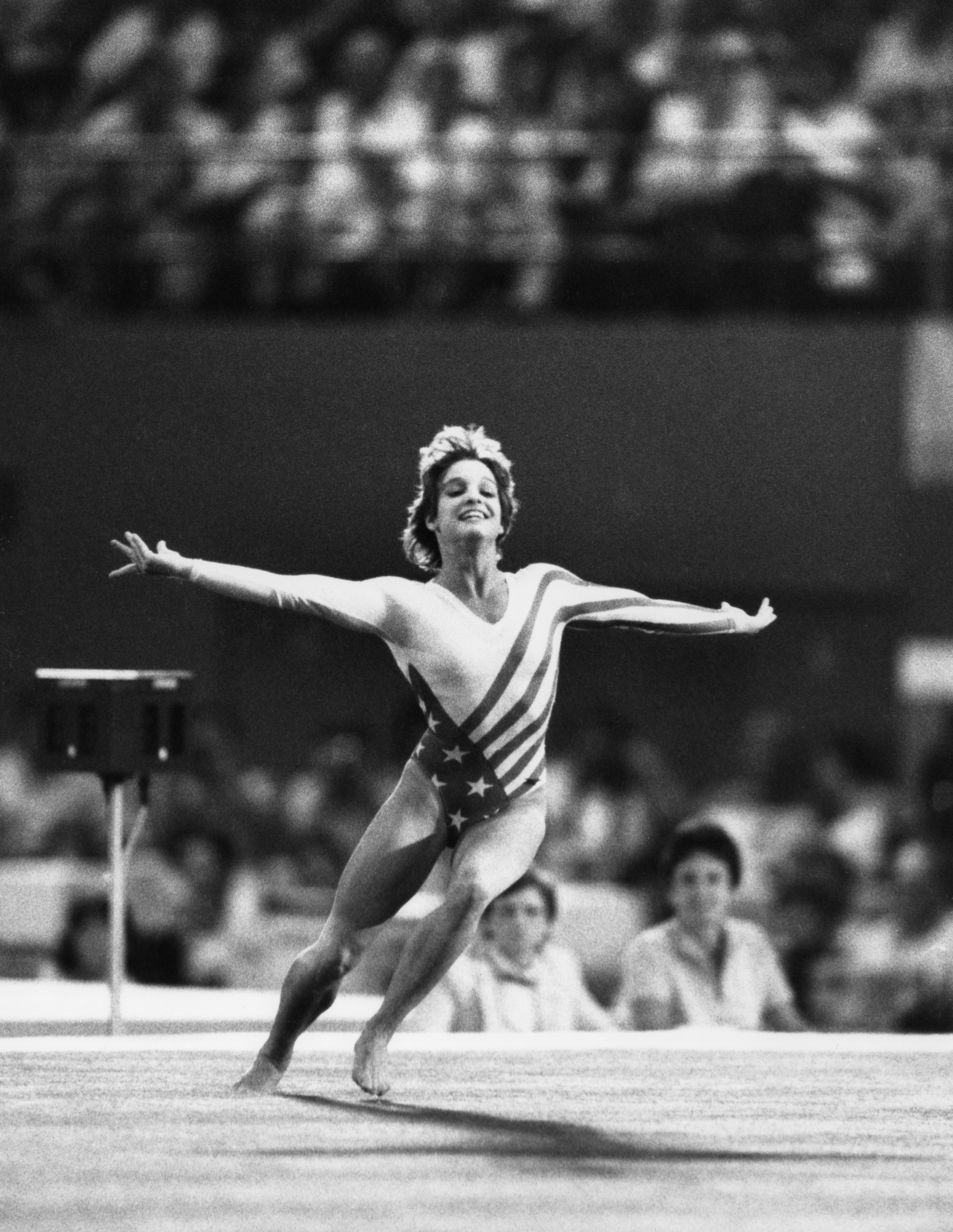At one time, her name was synonymous with triumph, perseverance, and national pride. But when reports emerged that a beloved American Olympic champion had been arrested in her home state, the public’s collective gasp was audible. The headlines didn’t tell the full story, and the real questions emerged only after a deeper look into the incident—and the life she has led in recent years.
On the surface, this may seem like another celebrity misstep. But beneath it lies a tragic narrative of vulnerability, public expectation, and a stunning twist that began decades ago in front of the world’s cameras.
This is the unfolding story of Mary Lou Retton.
A Sudden Turn of Events
In mid-May 2025, residents in Fairmont, West Virginia—the same town that once honored one of its most famous daughters with a street and a park in her name—watched in disbelief as local law enforcement released a brief but damning report.
On May 17, police responded to calls reporting a vehicle driving erratically on the Gateway Connector, just outside downtown Fairmont. The car in question? A Porsche with Texas plates. The driver? None other than Mary Lou Retton, America’s golden girl of the 1984 Olympics.
The details were troubling. Officers reported finding the vehicle parked in front of an AutoZone store, the engine still warm. Retton, now 57, was seated behind the wheel. Officers noted slurred speech, a strong odor of alcohol, and glassy eyes.
When she stepped out of the car, she stumbled.
According to the incident report later released on May 27, Retton failed three separate field sobriety tests. But the moment that captured the public’s attention was what police found in the passenger seat: a screw-top bottle of wine, open and partially consumed.
Though Retton refused a blood alcohol test, her arrest was filed under a single misdemeanor charge of driving under the influence of alcohol or controlled substances. She was released on a $1,500 personal recognizance bond later that same day.
For many, the shocking part wasn’t just the arrest. It was how far removed this moment felt from the story that had made her an American icon.

Mary Lou Retton performs the floor exercise during the 1984 Summer Olympic Games in Los Angeles, California | Source: Getty Images
From Gold Medals to Mugshots
Mary Lou Retton’s name is etched into the collective memory of a generation. Born in 1968 in Fairmont, West Virginia, she was inspired by Romanian gymnast Nadia Comăneci and pursued gymnastics with extraordinary discipline and passion from a young age.
As a teen, she moved to Houston, Texas, to train under Béla and Márta Károlyi, the same coaching duo that helped Comăneci reach Olympic glory. Under their demanding regime, Retton quickly rose to the top of the U.S. gymnastics rankings.
Her crowning achievement came at the 1984 Summer Olympic Games in Los Angeles. Despite undergoing knee surgery just weeks before the competition, she delivered a jaw-dropping performance that included two perfect 10s. Her fearless vault and mesmerizing floor routine clinched her the all-around gold, making her the first American woman to ever win the prestigious title.
In total, she earned five medals during those Games—one gold, two silvers, and two bronzes. Her success transformed her overnight from a gifted athlete to a national symbol of hope, determination, and youth.
.
A Life in the Spotlight
Following her Olympic triumph, Retton became a household name. She graced the covers of national magazines, appeared in television commercials, and was crowned the 1984 Sportswoman of the Year. The accolades poured in: endorsements, a role in President Reagan’s fitness campaign, and induction into the International Gymnastics Hall of Fame in 1997.
In Fairmont, she was a hero. A street was named in her honor. A park celebrated her legacy.
Her fame persisted into the ’90s and early 2000s, bolstered by television appearances, public speaking engagements, and brand partnerships. She exuded optimism, discipline, and classic American grit—the same qualities that made her a role model for countless young athletes.
But like many public figures, life beyond the spotlight proved more complicated.
The Health Crisis That Shook a Nation
In October 2023, Americans were shocked to learn that Retton had been hospitalized in critical condition. The diagnosis: a rare form of pneumonia that left her unable to breathe on her own. Her daughter, McKenna Kelley, a former NCAA gymnast, took to social media to share the dire situation.
Kelley revealed that her mother had been in the ICU for days, unconscious and clinging to life. What added to the public’s concern was an unexpected detail—Retton, despite her fame and legacy, was reportedly uninsured.
The family launched a Spotfund campaign to raise funds for her medical treatment. Initially seeking $50,000, the campaign resonated with thousands of supporters, eventually raising over $450,000.
While many rallied behind Retton, others voiced skepticism and criticism. How could a beloved American sports icon be uninsured and in need of donations? Was the financial distress genuine? And if so, how had it come to this?
Retton’s Response
In May 2024, Retton addressed the controversy during a deeply emotional interview with Entertainment Tonight. Visibly thinner and still recovering, she insisted that the donations had gone strictly to cover her overwhelming medical costs.
She added that any unused funds would be donated to the American Lung Association, signaling her intent to give back.
Another revealing conversation followed, this time with People Magazine. Speaking with rare vulnerability, Retton said:
“Girl, I should be dead. My daughters were told to come say goodbye. One of them told me, ‘Mommy, it’s OK. You can go.’”
She credited her survival to faith and divine intervention, explaining that “God wasn’t ready for me yet.” But she didn’t sugarcoat the aftermath. The toll on her body was enormous.
“It’s been really hard. My lungs are so scarred. It will be a lifetime of recovery. My physicality was the only thing I had, and it was taken away from me. It’s embarrassing.”
That raw honesty seemed to reframe public perception, at least temporarily. But just as Retton began reclaiming her narrative, May 2025 brought yet another blow.
The Arrest and Its Repercussions
The arrest felt jarring, particularly given the context of her near-death experience just 18 months prior. Legal analysts note that refusing a blood alcohol test in West Virginia doesn’t just complicate the case—it can have additional legal consequences, such as license suspension or enhanced penalties if found guilty.
But beyond the legal implications, the incident highlighted something deeper: the internal struggles Retton may have faced behind closed doors.
Those who’ve experienced major health trauma often describe lingering depression, anxiety, or even PTSD. For Retton, who spent decades being physically active and admired for her strength, the psychological effects of losing her vitality may have been devastating.
In small towns like Fairmont, such incidents don’t fade easily. Locals still remember the 16-year-old girl who brought Olympic gold back to West Virginia. Now, many are asking how that same girl—now a middle-aged woman—ended up in the back of a police car.
Public Reaction: Mixed and Polarized
The response to the arrest has been divisive. Some fans expressed sympathy, noting that Retton has endured a string of life-altering events in a short span of time. Others were less forgiving, suggesting that being a public figure means maintaining responsibility—especially behind the wheel.
“She was my hero,” one commenter wrote. “But this is disappointing.”
“She needs help, not judgment,” said another. “This could be the rock bottom that saves her.”
Mental health professionals weighing in have emphasized the importance of understanding the broader picture. “High-achieving athletes often tie their identity to performance,” said Dr. Ellen Moore, a licensed psychologist who specializes in post-traumatic recovery. “When illness, aging, or personal crisis strips that identity away, the emotional fallout can be severe.”
Redemption Possible?
It wouldn’t be the first time a public figure bounced back from adversity. But Retton’s case is unique in that her entire life has unfolded in public view—from Olympic glory to health scares to a courtroom docket.
Whether she chooses to address the DUI directly in future interviews remains to be seen. Thus far, neither Retton nor her representatives have issued a formal statement regarding the arrest.
There’s a possibility that her prior goodwill and transparency may work in her favor. After all, few could forget the way she inspired the nation during that vault in 1984—a moment that redefined American gymnastics and cemented her place in sports history.
Final Reflections: A Complicated Legacy
The story of Mary Lou Retton is no longer just about medals and routines. It’s about aging, vulnerability, health, financial hardship, and perhaps, a struggle for purpose after a life lived in the limelight.
As this chapter unfolds, the world watches with a mix of sorrow and curiosity—wondering whether the girl who once stuck the landing will find her footing again.
One thing remains certain: her story isn’t over.

